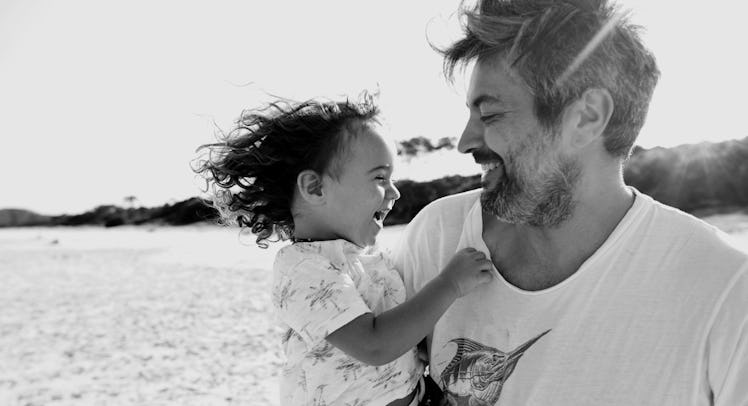Older Dads Will Change Fatherhood for the Better
Americans aren't having kids until much later. That's good news for the kids, but it cuts both ways for future grandparents.

A new report from the Centers for Disease Control and Prevention shows that while the national birth rate is falling for most women, it’s actually going up for women in their early 40s. Based on birth certificate data from American births in 2017, women aged 40 to 44-years-old gave birth at a rate of 11.6 births per 1,000 women, a remarkable two percent increase compared to 2016. This represents a continued demographic shift and one that will — in light of the fact that the average age difference for couples is roughly two years — ultimate effect how the next generation sees fathers. Older dads, along with older moms, are becoming the norm. And that might be for the best.
Full disclosure: I’m a dad in my early 40s. I came late to the game. My first kid wasn’t born until my late thirties. My second kid came just on the cusp of my 40s. But my opinion about how older dads will improve fatherhood’s image has little to do with vanity. It has more to do with how men mature as they age, which they undeniably do. My dad was just 20 when I was born. I essentially grew up with him. I was fully conscious that his twenties were difficult and that having a kindergartner in the room wasn’t helping.
Was he fun and active? Sure. Yes. But then he was divorced and not around so much. The benefits of having a younger dad didn’t outweigh the problems.
Still, that’s something of a strawman argument. There are a lot of years — 20 to be exact — between 20 and 40. People change profoundly during that period. I certainly did. Coping skills and anger management skills take time to develop. They took my dad time to develop and they took me time to develop. We probably got there around the same time, the difference? My kids were infants and I was a surly teenager.
I’m 40 and I’m confident in who I am as a person. I’m confident in my earning ability and I have enough perspective that I understand my role is to make sure I raise good boys. I’m a pretty stable dude. I’m probably less fun than I used to be, but I’m more predictable in ways that my kids seem to like. Kids, after all, love stability. They might not phrase it that way, but it’s true. They grow best when they know what to expect and when they have a routine. Add this to financial stability and a kid with an older parent appears to be looking at pretty good outcomes.
The greying of new dads is an interesting phenomenon on an economic level too. People are more stable in their 40s and more prepared for the burden of raising a kid. Even if they don’t have money, they likely have a better idea of how to get it.
Imagine a generation of children who are more comfortable providing and being emotionally present in their children’s lives. That’s certainly not a bad thing. There’s this sense — put forward by this publication and others — that fathers eager to engage with their children can change the nature of American families for the better. That almost certainly true, but engagement is a lot more positive when the person engaging is capable of doing so in a consistently productive way.
There is a downside, though. Being an older dad, I’m very aware I’ll miss out on a lot of my children’s lives. My parents have been able to watch their grandchildren grow. Should my kids decide to have kids of their own, I’ll glance them through a fairly narrow window. I will be an old person that smells funny and takes up room on the couch. And, yes, that’s a bummer.
The predictably irony is that I believe older dads are probably better for kids, but want my boys to have children as soon as possible. I liked being an older dad, but I’d love to be a young grandfather I would be very happy if my boys had kids early in their lives. Because while I’m happy to be an older dad, I wouldn’t mind being a young grandfather.